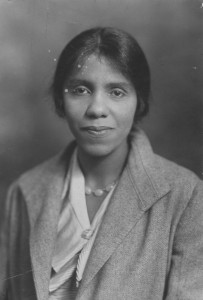Juliette Derricotte: Remembering Healthcare Denied
August 27, 2010
As told by Langston Hughes in November 1931 Juliette Derricotte was driving with three of her students from Fisk University in Nashville to her parent’s home in Georgia. Suddenly an approaching car, in order to pass a slower vehicle swerved toward the center of the road. Miss Derricotte, to avoid a collision, turned quickly to the side of the highway. Her wheels sank into a ditch, and her car turned over. The three students accompanying the Dean of Women were all badly injured. Passing motorists carried them into the nearest town, a small southern farming center. Here the white hospital refused point blank to give treatment to African-Americans, so the bruised and bleeding victims were not admitted. Instead they we taken to the house of a poor black woman of the town and there white doctors gave them attention, but without the necessary instruments and anesthetics that the hospital could have furnished.
Three of them were suffering intensely, but the least injured of the four, a young student was able to find a telephone. He called the nearest city in which a Negro hospital was located, and asked that an ambulance be sent for them. Late in the night the ambulance arrived, but on the way to the distant Negro hospital Juliette Derricotte died. A brilliant woman with much to offer was lost to America. Had not a white hospital refused to treat black people—even in so grave an emergency as this serious automobile accident—her life might have been saved.
Derricotte is most remembered today for her death and the national outrage it caused leading to a series of investigations; the NAACP became involved; the Commission of Interracial Co-operation of Atlanta made an investigation at the request of Fisk University and other organizations. Early in her career she worked with the YWCA traveling the globe studying in England and immersing herself in foreign cultures of India, Sri Lanka, and Burma. Through these experiences she was touched and transformed returning to Fisk University bringing her sense of global humanity and desire for a more just and human society.
Disparities persist in African-American health care while no longer a matter of overt discrimination the negative entrenched impact lingers. The burden of death and living remains far greater for people of color. In the United States, health disparities are well documented in minority populations such as African Americans, Native Americans, Asian Americans, and Latinos. When compared to whites, these minority groups have higher incidence of chronic diseases, higher mortality, and poorer health outcomes. Among the disease-specific examples of racial and ethnic disparities in the United States is the cancer incidence rate among African Americans, which is 10% higher than among whites. In addition, adult African Americans and Latinos have approximately twice the risk as whites of developing diabetes. Minorities also have higher rates of cardiovascular disease, HIV/AIDS, and infant mortality than whites.
While time chips away at the root causes of disparate health care Juliette Derricotte’s life and death endures as a reminder that universal health care should be a global concern, a human right and not a privilege.





